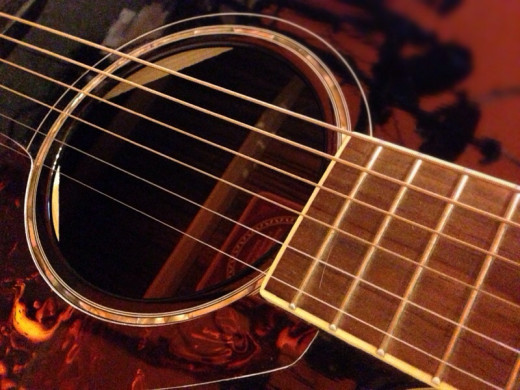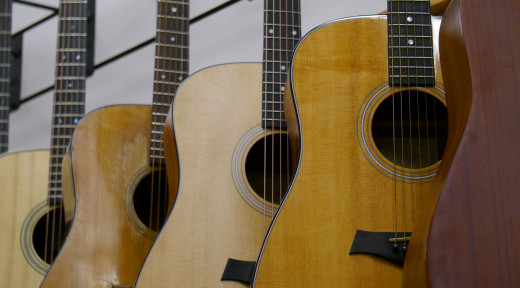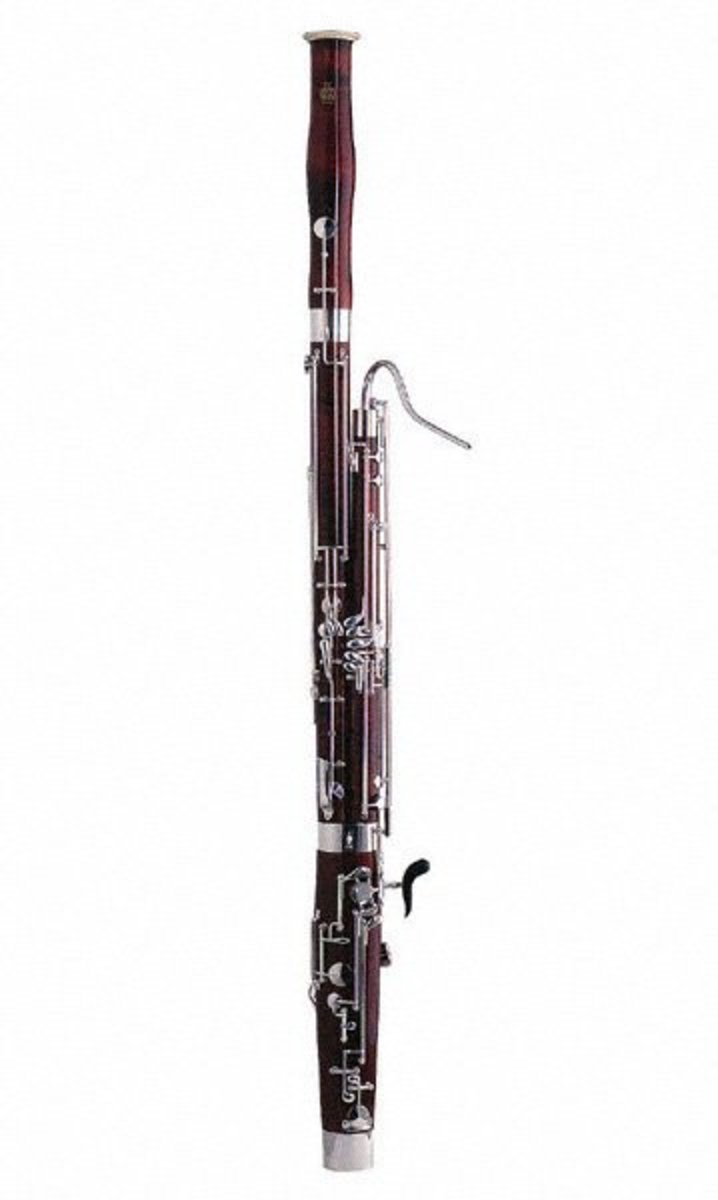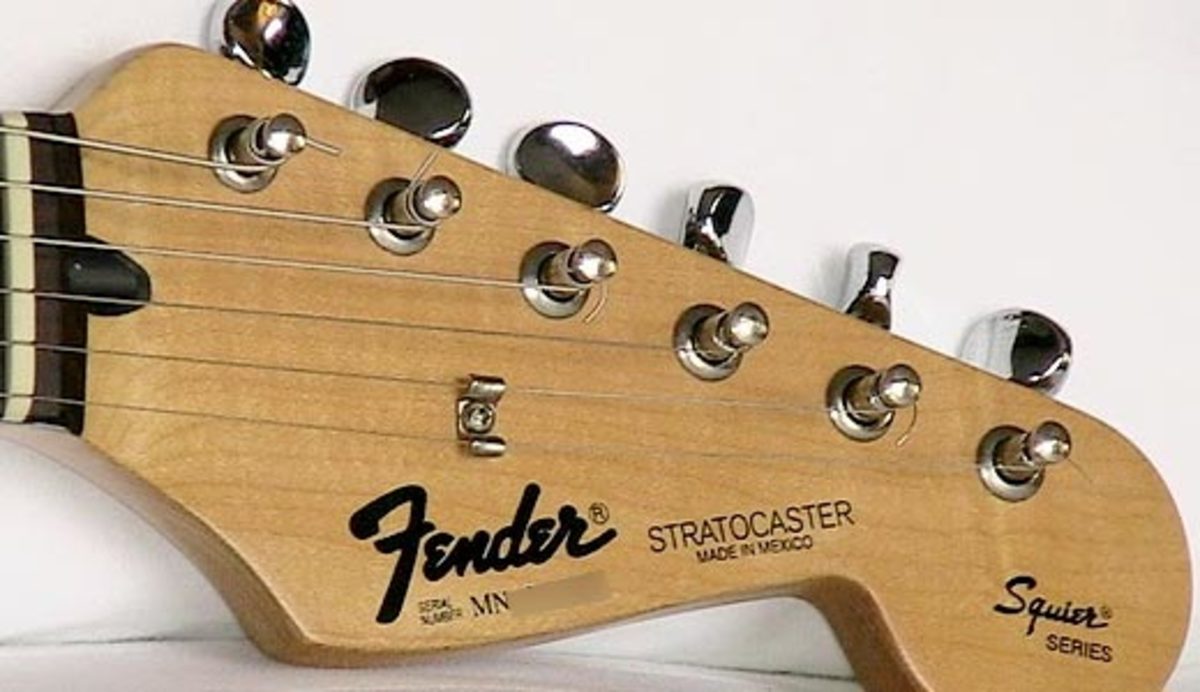5 Reasons You Should Play Guitar (and Where to Start)

A (very) brief history
When I was in high school it seemed like everyone was “in a band.” It's not surprising when you stop and think about it. Ancestors to the guitar have been found dating as far back as ancient Sumerian, Babylonian, and Egyptian civilizations - c. 2500-2000 BC. What we know as the guitar today can trace its lineage back to the turn of the 20th century, with the invention of steel strings. Before that, guitar was largely a classical instrument. But with the emergence of Jazz bands, the guitar began to take a more prominent role.
It really started to take off in the 1950s and 60's, thanks to rock and roll performers like Buddy Holly, Bill Haley and the Comets , and The Beatles. It's been a mainstay of popular music ever since. There are a host of reasons to learn to play the guitar. Here are a few that don't involve wooing the opposite sex (though that may still have it's merit, but I'm not sure in this age of auto-tuned boy bands...)
Benefits of playing a musical instrument
1. Keeps your brain fit.
Let's face it, everything you are - your likes and dislikes, all your memories, personal peccadilloes and eccentricities, how you view and relate to the world around you - is stored in your brain.
In short, you are your brain and your brain is you.
The simple fact is that your brain is like a muscle - the more you use it, the stronger it gets. This fact has been shown time and again and is the basis of research into how continued mental activity can help prevent cognitive decline, or at the very least slow the decline.
Research has shown that mental activity can slow the onset of mental decline. (read about it here)
Translation: a lifetime of learning new things and mastering new activities will increase your chances of remaining mentally acute later in life.
When it comes to music, there's so much going on in your brain that it makes an excellent way to boost your brain activity.
Consider that learning to read music is almost like learning to read another language; it stimulates the left side of the brain, where language is processed. But you don't even need to read music.
Many guitar players don't read music, but that doesn't mean they get no benefit. It turns out that while learning to read music stimulates the language centers of the brain, playing music involves pretty much all of your brain.
It makes sense when you think about it.
Your brain has to process the language of music into the finely coordinated muscle movements while maintain the abstract spacial relationship of the notes as they relate to time (i.e.: the melody and the tempo) all at once.
Talk about a workout!
In fact, playing music utilizes all the major parts of your brain. Music, it seems, is so important to humans that our brains have evolved to incorporate its appreciation and creation into the entire brain itself.
There have been well documented cases of people who have lost the ability to read a newspaper due to brain damage, but retain the ability to read music. Others have lost the ability to button their shirt but can still play piano.
Your brain on music
Playing music utilizes all the major parts of your brain. Music, it seems, is so important to humans that our brains have evolved to incorporate its appreciation and creation into the entire brain itself. There have been well documented cases of people who have lost the ability to read a newspaper due to brain damage, but retain the ability to read music. Others have lost the ability to button their shirt but can still play piano.
Resources
- Surprising Effects Of Music
Beneficial effects of music - how music affects our health and brain, including helps you to sleep better, learn and work better, heal some deseases, music effects on the brain. - Music improves language and memory (ABC Science)
- Benefits of music: Northwestern University study finds that playing music helps the brain - Chicago
Note to husbands who need excuses to play the guitar with their buddies and to parents justifying the cost of their children's piano lessons: A new study from Northwestern University in Evanston - Science Shows How Guitar Players' Brains Are Actually Different from Everybody Elses' - Mic
Their brains can do something the rest of us can't. - Clavier Companion - Piano lessons are good for you.
Clavier Companion-A magazine for people who are passionate about the piano.
2. Increases focus and discipline
Playing an instrument is more about discipline, focus and putting in the practice time than it is about being born with a gift. Sure, there are the child prodigies in every generation, but most people have to work at it, whether they're professional or amateur. This is true of most things in life, and the practice of playing an instrument will contribute to an increase in discipline in other aspects of your life as well, and you'll have loads of fun along the way!
3. stress management
I'm sure you're aware of the relaxing nature of music from your own experience. Listening to music you enjoy can not only replenish your energy and revitalize your mind and body, but it can cause feelings of stress to evaporate.
Whether it's traditionally relaxing music to help aid with meditation or music to get you up and moving, music has a measurable and positive effect on your body and mind.
Playing music can have the same effect. It can quiet the mind, relieve tension from a stressful day at work and create a sense of accomplishment and confidence in having mastered a new technique or created something of your very own. It's a wild thrill.
The good news here is that you don't have to be a Mozart or Clapton when making music. Just the recreational aspect of "messing around" and making sounds has the effect of short-circuiting the stress reaction in your brain. It's like a big reset for the nervous system because it engages so many parts of your brain that you find yourself either focusing on the music and sounds (and forgetting about your stressful day), or you zone out in zen-like bliss as your brain and body go on auto pilot. Either way, the effect is the same - relaxing, and revitalizing.
Music and Relaxation
- The Power of Music To Reduce Stress | Psych Central
The soothing power of music is well-established. It has a unique link to our emotions, so can be an extremely effective stress management tool. Listening to - Music Therapy, Stress, Stress Relief, stress management, Relaxation, holisticonline.com
Music Therapy. Music therapy is useful in relieving stress and other conditions. Many experts suggest that it is the rhythm of the music or the beat that has the calming effect on us although we may not be very conscious about it. The influence of mu - How Making Music Reduces Stress
Making music is just what the doctor ordered to fight the ill effects of chronic stress. - Music as a Health and Relaxation Aid
Learn about music relaxation: how and why music affects the body and can be used as an effective stress reliever and stress management tool, and find resources on using music for relaxation and stress management for increased health.
4. express yourself
People often times feel stressed or suffer from anxiety caused by an inability to express their emotions. Sometimes this is a conscious state, but often times it's subconscious. Whether you're feeling down and a bit depressed, or angry and agitated, playing an instrument helps give you another voice with which to communicate your emotions in a safe and effective way.
Often times, this new voice is more instinctive and subconscious in nature, so you may find yourself expressing how you feel without feeling the need to explain why you feel the way you do. The overall effect can be one of release, not unlike a giant sigh of relief to have gotten something off your mind that was weighing you down.
5. fosters creativity
We are all inherently creative beings, some simply tap into their creative side more easily than others. Creativity and imagination is a natural part of being human, if it wasn't we wouldn't read fiction or watch movies and television.
Playing an instrument helps you tap into your creative spirit more easily. Aside from the reduced stress in your life, you'll begin to find that you see new solutions to everyday problems.
This is part of your brain re-wiring itself the more you practice and play. This in turn unlocks the creative parts of your brain and opens up new pathways, forming new connections you might not have noticed before.
Why play guitar?
Most of the benefits on this list come from learning to play any musical instrument, but guitar is relatively inexpensive to start. Also, there are a host of resources for learning to play guitar online and decades of popular music to learn.
When you learn piano, you are limited to using sheet music which is often times only available for purchase. By contrast, guitar players often use a form of notation unique to modern string instruments called Tablature, or Tabs for short. Guitar tabs are available for free for most popular music on a variety of websites.
There are also mountains of books and videos to help you teach yourself. I've found YouTube to be a huge resource. Sure, there are a lot of "free" video lessons aimed at getting you to sign up for online lessons, but you can learn a lot from the free teaser videos, and even from ordinary hobbyists who post their videos just to show off their skills and knowledge.
Best of all, playing guitar is a hobby that grows with you. You can start for as little as a few hundred dollars, and upgrade as you improve. If you decide to play electric guitar, then you can easily find all sorts of effects, amplifiers and other gear to spend thousands on, but you don't need that either; you can have a very complete and capable rig for much less than $1,000 (usually as little as $300-500).
Still, it's probably best to start playing on an acoustic guitar because it lets you focus on the basics and develop good technique, and an acoustic guitar is very portable.

What to look for when buying a guitar
As a general rule of thumb, most acoustic guitars that sell for less than $200 are not going to be a good enough quality to let you focus on playing. A cheap guitar will go out of tune quickly and often and be more difficult to play than a better made (and more expensive) guitar. But you don't need to spend a thousand dollars either.
Here's an excellent list of inexpensive acoustic guitars that are great for beginners. Most of those are less than $400, but good quality so that they will help you learn instead of get in your way.
Conclusion
Whether you're looking to embark on a new hobby with the hopes of earning some extra cash in a band some day, looking for a fun way to sharpen your mind and help unwind after a hectic day at work, or just looking for ways to pass the time, learning guitar can be a rewarding and fulfilling experience.
Resources for learning
- musictheory.net
- WholeNote - The On-Line guitar Community - with guitar lessons OLGA guitar tab music chords scales a
WholeNote features free guitar lessons with tablature and playback. With OLGA tab search, composition tools, resources, accessory and sheet music reviews, chords, scales, and more! - Guitar Lessons @ Ultimate-Guitar.Com
Free online lessons for guitar and bass at Ultimate-Guitar.Com - how to play guitar for beginners - YouTube
Share your videos with friends, family, and the world - http://www.guitarnoise.com/
Learn how to play guitar with free online lessons. Best starting place for beginners with our easy guitar songs. Home of David Hodge guitar lessons.

![5 Reasons Why Music is Important in any Society [Updated 2020] 5 Reasons Why Music is Important in any Society [Updated 2020]](https://images.saymedia-content.com/.image/t_share/MjA0NjIzNTE4NDE4MTUxMzUz/why-is-music-important.png)






